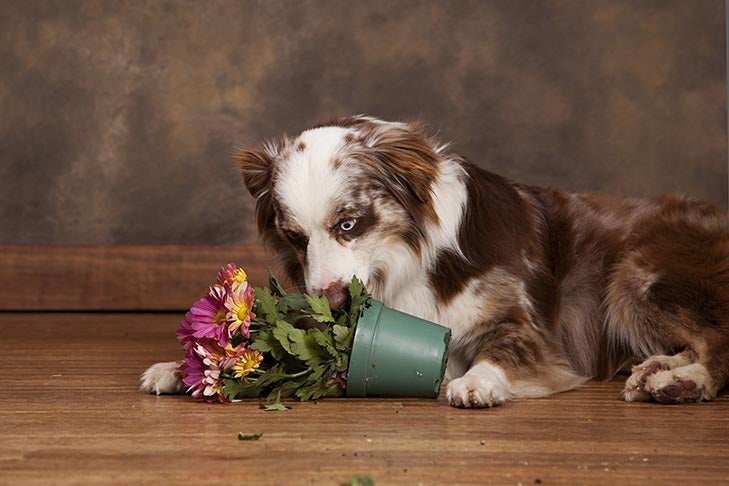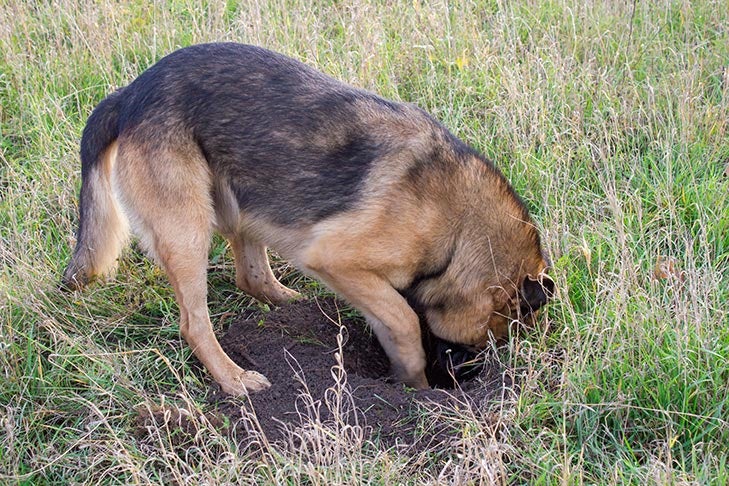Few things are more enjoyable for dogs than a good romp through the great outdoors, which includes your backyard. On paper, that seems like the ideal situation because it will allow your dog to spend time in the outdoors without having to visit a dog park. You can give your dog exercise and mental stimulation while unwinding or completing some work or household chores.
Naturally, however, nothing is ever that simple. Dogs left unattended in the yard may start eating soil from indoor plants or licking the soil on your property, which could be a hint of something sinister. Dogs use their noses and mouths to explore their surroundings, so they will likely taste a variety of unpleasant things. Can you be certain that those substances are safe?
The truth is that your backyard might contain numerous dangers for Fido. Your pet may be ingesting pesticides, wildlife, and toxic plants if they start eating dirt and soil, which could lead to serious health problems. Stop your dog from eating dirt and potting soil from your garden or anyone else’s if you want to avoid a sick dog and numerous expensive trips to the vet.
This article will examine the reasons behind a dog’s urge to eat dirt, when you should be concerned about this behavior, and what you can do to stop it.
How to Stop Your Dog From Eating Dirt
According to Dr. Ellen M. Lindell of Veterinary Behavior Consultations, PC, it is important to learn the reason for the behavior before working on a treatment plan and giving recommendations. “The diagnosis drives the treatment.”
There are numerous ways to address and stop the behavior because there are numerous reasons why your dog might be interested in eating dirt.
Keefe advises treating any underlying medical conditions first if your pet’s dirt eating is a result of them. Normal baseline blood tests will check organ function to detect kidney or liver disease and screen for anemia. Once a diagnosis is made, your veterinarian will create a treatment strategy specifically for your dog that should end the behavior of eating dirt.
Keefe advises consulting your veterinarian or a veterinary nutritionist if your dog is showing signs of dirt eating after you either recently changed the dog’s food or feed him a home-cooked meal. If diagnostic tests reveal that your dog has a nutritional deficiency, the vet may then suggest a particular diet or supplements.
Keefe suggests feeding the pet an AAFCO-approved diet that is nutritionally complete and “certified as suitable for their size and life-stage” as a preventative measure. To make sure the dog food is properly balanced, look for the AAFCO statement on the bag or label.
Lindell advises pet parents to provide enrichment that the dog prefers in situations where there is a lack of mental stimulation or boredom causing dirt eating. “That can include food, toys, social interaction with the owner or other dogs, or other things.” ”.
Keefe recommends giving the dog more daily exercise and playtime. “You can also give them interactive toys, like puzzle toys or food, to give them mental stimulation, especially if they are left alone at home for an extended period of time.” ”.
Lindell advises giving the dog access to “satisfying alternative behaviors such as creating search-and-find food containers in the dirt area” if the dog is acting out of frustration or compulsive behaviors. ”.
Additionally, training could stop your dog from digging and consuming dirt. Lindell advises using a leash when your dog is approaching a corner of your yard to prevent the dog from having easy access to the ground. However, she advises against trying to “correct” by jerking the leash or reprimanding the dog. “You can train a ‘leave it’ using reward-based methods. ”.
According to Lindell, outdoor training and playtime are crucial because “the yard does not become the snack bar but represents a place to enjoy social activity.”
According to Keefe, stress “can also play a role in the emergence of behavioral issues.” Changes in routine or environment, particularly when pet parents return to work after an extended period at home, can be stress triggers for your dog. These dogs could gain from having a “safe space” in the house where they can retreat and feel at ease.
Some natural therapies and products may also help relieve anxiety. Keefe recommends pheromone collars or anxiety wraps. Stress reduction for dogs may also be aided by calming treats or supplements. Keefe advises seeking “the help of a behavioral specialist who can assist with techniques such as desensitization and counterconditioning” for severe stress and anxiety problems. ”.
Why Is My Dog Eating Dirt and Throwing Up?
Because of the way that dogs’ bodies are designed, whenever they consume anything that is not edible, they will attempt to vomit the unwanted substance out of their system.
According to Keefe, “Eating dirt and other non-food items can occasionally be a sign of digestive discomfort in dogs, and they ingest this material in an effort to find some relief.”
She adds that a single episode of vomiting and ingesting a small amount of dirt might not require veterinary care. However, if the dog “repeatedly vomits or gags without bringing anything up, has diarrhea, seems in discomfort, or is lethargic, pet parents should have the dog examined by a veterinarian.” ”.
Puppies are naturally inquisitive creatures who enjoy nothing more than rolling around in the grass and searching for treats. As they explore the world, “they are more likely to inadvertently ingest dirt,” claims Keefe.
To rule out any of the underlying issues mentioned above, have the puppy examined by a veterinarian if you notice him repeatedly eating dirt.
Keefe advises discouraging them from engaging in this behavior in order to prevent it from becoming a habit in adulthood. Use a toy, treat, or engaging game to divert your puppy’s attention away from the dirt, and reward him or her when they avoid it by giving him or her praise.
Avoid reprimanding, yelling at, or punishing your puppy for ingesting dirt to avoid tension in your relationship and potential ill feelings toward the outdoors or your backyard.
Your dog may experience a variety of issues if it eats dirt. According to Keefe, consuming large amounts could result in a life-threatening gastrointestinal impaction or blockage that might necessitate emergency surgery.
Dirt may also contain harmful substances that could hurt your dog. Small rocks could chip your dog’s teeth, toxic pesticides or fertilizers could suffocate or suffocate your dog, and in some extreme cases, choking or intestinal blockage could result. Sharp sticks could puncture their mouth, throat, or intestinal tract. Additionally, there is a chance that contaminated soil will cause your pet to consume intestinal parasite eggs or other contagious organisms.
Clubs Offering:
You may have observed your dog eating (or attempting to eat) some incredibly bizarre things as a pet owner. However, have you ever caught your pet munching on pure dirt?
Holistic veterinarian Dr. Laurie S. Coger, DVM, explains, “Dirt eating is a form of what is termed ‘pica,’ the ingestion of nonfood materials. There are many causes, including nutritional, behavioral, and physical. Stress or boredom can also lead to eating all sorts of things, including dirt.”
You shouldn’t ignore your dog’s persistent dirt-eating behavior. It might be a symptom of something more serious, like:
Dr. While stomach and gastrointestinal conditions may be to blame for your dog’s interest in dirt, Coger points out that in these circumstances, dogs are more likely to seek out grass. It’s time to visit the vet, she advises, “if [the dirt eating] is frequent, intense/manic in nature, or large amounts are consumed.” Changes in stools are another indication that a vet visit is necessary. In order to identify the cause, bloodwork to check for underlying abnormalities may be useful. ”.

As you might anticipate, allowing your dog to continuously eat dirt carries some risks. If your dog eats a lot at once, the main concern is impaction of the intestine (hardened stool that becomes lodged in the body as a result of prolonged constipation). Impaction often means surgery. “.
If enough dirt was consumed, the pesticides, fertilizers, or other toxins in the dirt could accumulate to toxic levels. Coger adds. Dental damage or wear could also be a concern, depending on the dirt. For instance, if the dirt contains rocks, this could harm your dog’s teeth and cause obstruction in the throat or anywhere along the digestive tract. Sharp objects could pierce your dog’s mouth, throat, intestine, or stomach linings. Additionally, your dog might consume a parasite along with the dirt, which could result in a variety of additional health problems.
“I would add that any new, abnormal behavior, like eating dirt, should be addressed right away,” Dr. According to Coger, “both due to potentially serious underlying causes and before it develops into a habit.” Who wants a house full of dirt eaters? Dogs will learn from other dogs in the house.

Consult your veterinarian about your dog’s diet to see if any changes need to be made if you’re concerned that your dog’s tendency to eat dirt is a result of a nutritional imbalance. Make sure your dog receives enough mental and physical exercise to prevent dirt eating that results from boredom. Denying access to favorite dirt-eating areas may be necessary if all else fails, according to Dr. Coger says. Keep in mind that dirt eating could be a sign of something more serious.
FAQ
Will my dog get sick if he eats dirt?
Your dog may experience a variety of issues if it eats dirt. According to Keefe, consuming large amounts could result in a life-threatening gastrointestinal impaction or blockage that might necessitate emergency surgery.
What to give a dog that eats dirt?
If they are malnourished and starving, dogs may also turn to eating dirt. The dirt fills them up and helps them get some of the minerals they need. If a lack of minerals is the cause of your dog’s habit of eating dirt, consider switching to high-quality dog food.
Can eating dirt give dogs diarrhea?
Call your veterinarian right away if your dog’s dirt eating starts out suddenly, intensifies, or is accompanied by other physical or behavioral symptoms like excessive thirst, diarrhea, excessive urination, vomiting, eating other non-food items, or seizures.